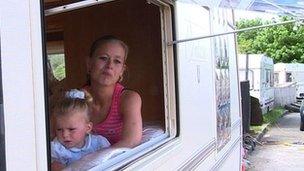Gypsy sites: Welsh councils 'could face prosecution'
- Published
The bill will be voted on this autumn and about 400 new pitches are needed
Councils across Wales could face prosecution under a proposed new housing bill unless new Gypsy and traveller sites are built.
The bill will be voted on this autumn and about 400 new pitches are needed.
In areas such as Swansea and Newport there is fierce opposition to plans for new sites.
Supporters say a new law would force councils to do more as the travellers have human rights, and a way should be found to accommodate them.
Both Swansea and Newport councils have had thousands of objections from home owners and businesses, who do not support attempts to find new sites.
Figures obtained by the BBC Wales' Week In Week Out programme show that across Wales about 400 new pitches are needed, with room for around 1,200 caravans.
In Swansea five areas have been considered. Two of the sites are in Gorseinon, where there is opposition because one is earmarked for a cemetery and the other is a local green space.
Town councillor and former mayor Malcolm Curtice said many people in the area wanted to keep the fields.

Chantelle Price says she would move if she had somewhere else to go
"If they want a permanent site - have a permanent house," he said. "The law is an ass [it] has been often said. The law is wrong, full stop."
Father-of-eight Jimmy Gilheaney, who lives with his extended family on an official council-run site in Swansea, said: "We have everything we need but could do with a bit more space.
"We have no intentions of leaving this site, we are quite happy where we are but in time to come when the bigger children grow up they may need a different site."
Mr Gilheaney told the programme he was angry at the level of protest and objection to a new site.
"They are out with picketing boards protesting. If that was a black person what would be said then - is it because they are Gypsies that it's OK to do that?"
The programme also revisits a traveller family first filmed by Week in Week Out 21 years ago. They are still living on an unofficial site, with few amenities and no idea how long it will before the new one is built.
Another Gypsy family allows the cameras in to see the conditions they are living in on land owned by the Welsh government.
It is directly under large pylons, has no mains electricity and up to 35 children and adults share a single tap and toilet.
Mother-of-three Chantelle Price said some local people had been hostile.
"They call us stinking pikeys, stinking Gypsies - get back where you came from... and all that. If we had anywhere else to go we wouldn't be here.
"All we want is a site - a home to say is our own - where we can stay all the time and be safe for our kids."
Julie Morgan, chair of the cross-party Welsh assembly group on Gypsies and travellers, said a new law would finally force councils to do more than just try to find suitable sites.
"We have to grasp the nettle and try and find places for people to live. They have human rights.
"Surely in Wales we can accommodate those people so they have somewhere to live and bring their children up?"
Ms Morgan said she did not think this was "too much to ask".
"Our job here is to make laws and I am very glad that we are putting this legal duty on," she added.
Swansea and Newport councils said they were assessing all the objections they have received and it could be months before any final decisions are made.
Week in Week Out is on BBC One Wales on Tuesday 11 June at 22:35 BST.
- Published5 May 2013
- Published9 January 2013
- Published5 November 2012